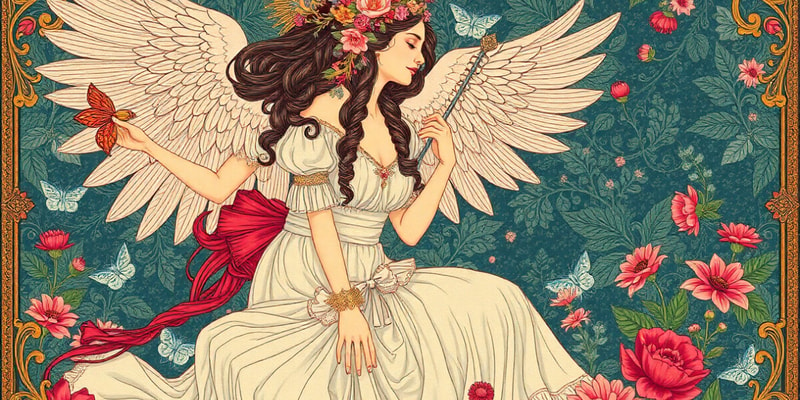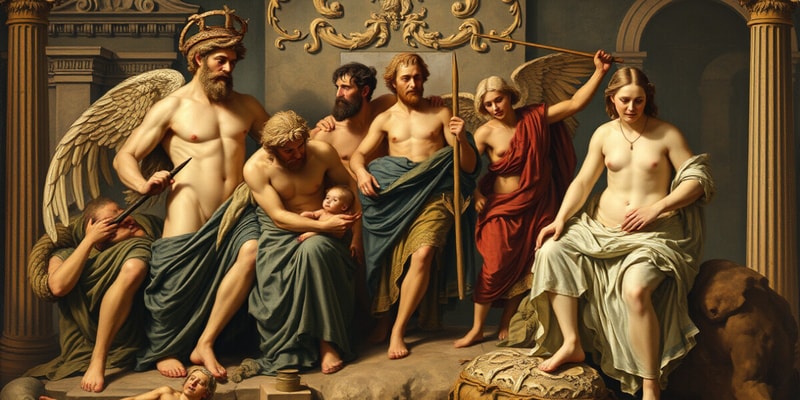Questions and Answers
A classical myth is a story that has attained a kind of ______ due to its archetypal beauty.
immortality
The term '______' refers to a story that is grounded in the world of today.
legend
In folklore, the stories can take place at ______ such as any time or any place.
any time
Myths are characterized by having a ______ attitude that often involves sacred themes.
Signup and view all the answers
Folk tales can feature characters that are ______ or nonhuman.
Signup and view all the answers
Mythology is the study of ______.
Signup and view all the answers
In the Archaic Period, important works such as the Iliad and the ______ emerged.
Signup and view all the answers
The Classical Period is characterized by a height of Greek commitment to ______ and beauty.
Signup and view all the answers
The study of myths includes various ______ approaches to interpretation.
Signup and view all the answers
Etiological myths explain the ______ of some fact or custom.
Signup and view all the answers
The myth of Apollo driving his ______ is an example of natural mythology.
Signup and view all the answers
Euhemerus proposed that the gods were originally ______, who later became deified for their great deeds.
Signup and view all the answers
Max Müller believed that all myths are ______ of nature, describing meteorological and cosmological phenomena.
Signup and view all the answers
Freud's Oedipus complex is a concept relating to ______ and family dynamics.
Signup and view all the answers
Carl Jung emphasized that myths contain ______, which are traditional expressions of collective dreams.
Signup and view all the answers
According to the ritualist approach, myth implies ______, and ritual implies myth.
Signup and view all the answers
Freud believed myths are similar to ______ in their arrangement of symbols.
Signup and view all the answers
Jung believed that societies are psychologically dependent on their traditional ______.
Signup and view all the answers
The metaphorical approach to myths was reshaped by the theories of ______ and psychoanalysts.
Signup and view all the answers
Allegorical approach interprets myth in a non-literal way, as an extended ______.
Signup and view all the answers
Study Notes
Defining Myth and Mythology
- Myth: A story with varying definitions; from "mythos" meaning word or story.
- Classical Mythology: Stories that attain immortality through archetypal beauty and transformative power across generations.
- Distinctions: Myths (sacred), legends (secular), and folktales (fictional) differ in fact, time, place, attitude, and character type.
Historical Context of Myths
- Archaic Period (750-490 BCE): Origin of major texts like "The Iliad," "The Odyssey," and contributions from Homer and Hesiod.
- Classical Period (490-323 BCE): Athenian exploration of myths with significant advancements in arts, philosophy, and the rationalization of mythos vs. logos.
- Hellenistic Period (323-30 BCE): Emergence of educated critiques and responses, alongside the influence of Alexandrian scholars post-Roman conquest.
Study Focus of Classical Mythology
- Encompasses primarily myths from Archaic and Classical periods, along with influences from the Ancient Near East and Roman narratives.
Approaches to Myth Interpretation
- Etiological Approach: Explains origins of facts/customs through myths.
- Rationalizing Approach: Proposed by Euhemerus, suggesting gods were once deified humans.
- Allegorical Approach: Created by Max Müller, presenting myths as metaphors for natural phenomena.
-
Psychological Approaches:
- Freudian Theory: Explores the connection between myths and dreams, focusing on concepts like the Oedipus complex.
- Jungian Theory: Addresses collective unconscious and archetypes depicted in myths, emphasizing the psychological dependence on traditional narratives.
Societal and Ritual Contexts
- Ritualist Approach: Argues that myth and ritual are inseparable.
- Functionalism: Myths serve as social charters explaining established customs, challenged by figures like Malinowski.
Structuralism in Myth Study
- Vladimir Propp: Identified common structural patterns in Russian folktales using motifemes.
- Claude Lévi-Strauss: Focused on binary oppositions in myths as a reflection of societal conflicts.
- Walter Burkert: Combined structuralism with classical scholarship, positing myths as traditional tales with cultural significance.
Comparative Studies
- Differentiates between oral traditions and literary expressions, highlighting Joseph Campbell's comparative methodologies.
Greek Creation Myths
- Significance: Creation narratives are crucial for understanding anthropomorphic deities and the diversity of identities within myths.
-
Hesiod's Contributions:
- "Theogony": First literary exploration of divine genealogy.
- "Works and Days": Introduced myths like Pandora's story and the Five Ages of Mankind.
- Key Figures and Events: Birth of various gods, including the secret emergence of Zeus and his subsequent victories that establish cosmic order.
Interpretation of Chaos and Eros in Creation
- Chaos: Considered both a void and a foundational principle, raising questions about its temporal and generative role in the cosmos.
- Eros: Represents love's vital role in creation, as indicated in Aristophanes' tales emphasizing Eros's unifying effects.
Studying That Suits You
Use AI to generate personalized quizzes and flashcards to suit your learning preferences.
Description
This quiz explores the essence of classical myths and their definitions. It discusses the complexities of what constitutes a myth and how these ancient stories continue to resonate in contemporary discussions. Dive into the archetypal beauty and profound meanings behind these enduring narratives.




